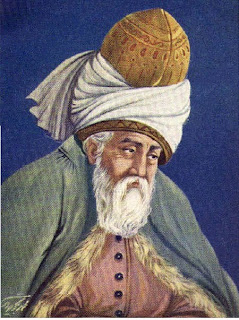Life of Rumi
Reason is powerless in the expression of Love.
Love alone is capable of revealing the truth of Love and being a Lover.
The way of our prophets is the way of Truth.
If you want to live, die in Love; die in Love if you want to remain alive.
I silently moaned so that for a hundred centuries to come,
The world will echo in the sound of my hayhâ1 hayhâ and hayhât, a corruption of the same term in Persian means 'alas' or 'woe to me!'
It will turn on the axis of my hayhât
(Divan, 562:7)
The name Mowlana Jalaluddin Rumi stands for Love and ecstatic flight into the infinite. Rumi is one of the great spiritual masters and poetical geniuses of mankind and was the founder of the Mawlawi Sufi order, a leading mystical brotherhood of Islam.
Rumi was born in Wakhsh (Tajikistan) under the administration of Balkh in 30 September 1207 
He was introduced into the mystical path by a wandering dervish, Shamsuddin of Tabriz. His love and his bereavement for the death of Shams found their expression in a surge of music, dance and lyric poems, `Divani Shamsi Tabrizi'. Rumi is the author of six volume didactic epic work, the `Mathnawi', called as the 'Koran in Persian' by Jami, and discourses, `Fihi ma Fihi', written to introduce his disciples into metaphysics.
If there is any general idea underlying Rumi's poetry, it is the absolute love of God. His influence on thought, literature and all forms of aesthetic expression in the world of Islam cannot be overrated.
Mevlana Jalaluddin Rumi died on December 17, 1273. Men of five faiths followed his bier. That night was named Sebul Arus (Night of Union). Ever since, the Mawlawi dervishes have kept that date as a festival.
The day I've died, my pall is moving on -
But do not think my heart is still on earth!
Don't weep and pity me: "Oh woe, how awful!"
You fall in devil's snare - woe, that is awful!
Don't cry "Woe, parted!" at my burial -
For me this is the time of joyful meeting!
Don't say "Farewell!" when I'm put in the grave -
A curtain is it for eternal bliss.
You saw "descending" - now look at the rising!
Is setting dangerous for sun and moon?
To you it looks like setting, but it's rising;
The coffin seems a jail, yet it means freedom.
Which seed fell in the earth that did not grow there?
Why do you doubt the fate of human seed?
What bucket came not filled from out the cistern?
Why should the Yusaf "Soul" then fear this well?
Close here your mouth and open it on that side.
So that your hymns may sound in Where- no-place!
0 comments to “Rumi-khuda ke sache bandhe”